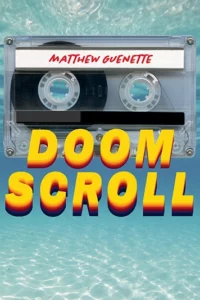
This week, Matthew Guenette’s students at Madison College will read our submission queue! The students will select three stories to send directly to our senior editors for consideration. Our Coordinating Editor, Shasta Grant, talked to Matthew about his students his new book of poetry.
Shasta Grant: Can you tell us more about your school and your students?
Matthew Guenette: Madison College is a two-year college with an incredibly diverse student body. About 15,000 students are enrolled at the school, and the majority of my students are in the liberal arts transfer program, working through the core curriculum before heading off to a four-year school. My students are hungry, driven. I’m so impressed by them, and consider it one of the truly great privileges of my life that I get to be part of their artistic journeys.
What do you hope your students will learn from this experience?
Bear with me. I use a labor-based grading system in my classes. In creative writing this means the conversation shifts from grades to the writing itself. Part of our “labor” includes acts of literary citizenship. Reading for Smokelong gives my students a chance to experience that process, to see what it’s like to make challenging editorial decisions that ultimately help bring another writer’s voice into a published space. That’s incredibly important work that in my experience often goes unrecognized in a creative writing classroom. I also want my students to get a sense of the effort and skill it takes for a piece of writing to even rise to a level deemed publishable. I have lots of talented writers for students. I’m hoping reading for Smokelong both challenges them and encourages them to keep working.
How do you use flash fiction in the classroom?
I love flash genres in general, and flash fiction in particular because it challenges writers to get to the heart of their story. A story constrained by, say, 500 words, is a powerhouse of opportunity. Everything–dialogue, character, tension–can be tracked. Teachable moments reveal themselves quickly in flash fiction, as the form itself encourages students to work quickly, even recklessly, to not to be overly fussy in service of discovering their strengths and weaknesses. The DNA for poetry, fiction, nonfiction…You can find all of it there in flash-fiction.
You’ve got a new book of poems coming out soon with The University of Akron Press. Tell us about it!
 It’s out now! It’s called DOOM SCROLL. While it’s technically poetry, all the poems are prose poems, and many of them actually have their beginnings in flash fiction. Definitely a pandemic book, driven by the anxieties I experience–as a partner, a dad–that often drive my writing. That’s what the book is about, the anxieties of middle age in time that, due to climate change and technology and sharp political divisions, gives rise to its own kind of existential angst. But the book isn’t tragic or gloomy all. If anything, the vision is comic. That’s where my favorite poetry often resides, in a kind of gallows humor where our laughter functions as a momentary stay against the madness.
It’s out now! It’s called DOOM SCROLL. While it’s technically poetry, all the poems are prose poems, and many of them actually have their beginnings in flash fiction. Definitely a pandemic book, driven by the anxieties I experience–as a partner, a dad–that often drive my writing. That’s what the book is about, the anxieties of middle age in time that, due to climate change and technology and sharp political divisions, gives rise to its own kind of existential angst. But the book isn’t tragic or gloomy all. If anything, the vision is comic. That’s where my favorite poetry often resides, in a kind of gallows humor where our laughter functions as a momentary stay against the madness.
___________________________________________
Matthew Guenette’s most recent poetry collection is Doom Scroll (University of Akron Press, 2023). He is also the author of Vasectomania (2018), American Busboy (2011), and Sudden Anthem (2008). He teaches writing at Madison College, a two-year college in Madison, WI, where he lives with his wife, their two children, and a twenty-pound cat named Butternut.
Shasta Grant is the author of the chapbook Gather Us Up and Bring Us Home (Split Lip Press, 2017). She won the 2015 Kenyon Review Short Fiction Contest and the 2016 SmokeLong Quarterly Kathy Fish Fellowship. She has received residencies from Hedgebrook and The Kerouac Project and was selected as a 2020 Aspen Words Emerging Writer Fellow. Her work has appeared in cream city review, Epiphany, Hobart, wigleaf, and elsewhere. She has an MFA from Sarah Lawrence College and lives in Indianapolis.

 The core workshop of SmokeLong Fitness is all in writing, so you can take part from anywhere at anytime. We are excited about creating a supportive, consistent and structured environment for flash writers to work on their craft in a community. We are thrilled and proud to say that our workshop participants have won, placed, or been listed in every major flash competition. Community works.
The core workshop of SmokeLong Fitness is all in writing, so you can take part from anywhere at anytime. We are excited about creating a supportive, consistent and structured environment for flash writers to work on their craft in a community. We are thrilled and proud to say that our workshop participants have won, placed, or been listed in every major flash competition. Community works.